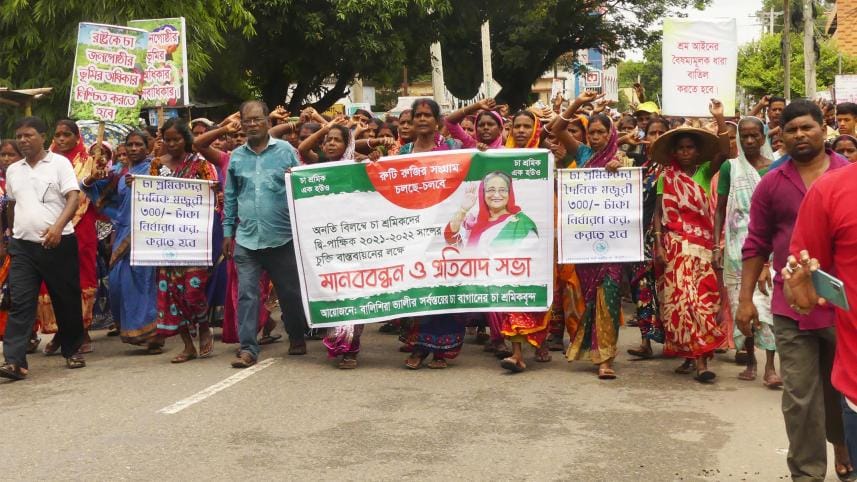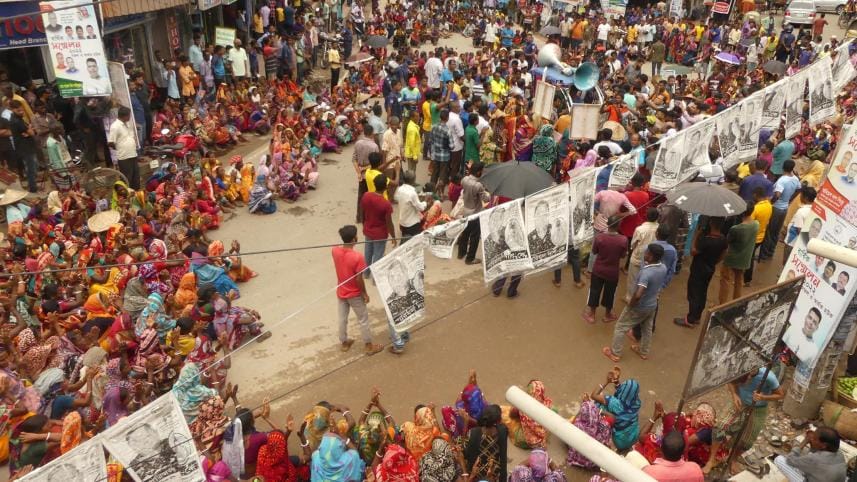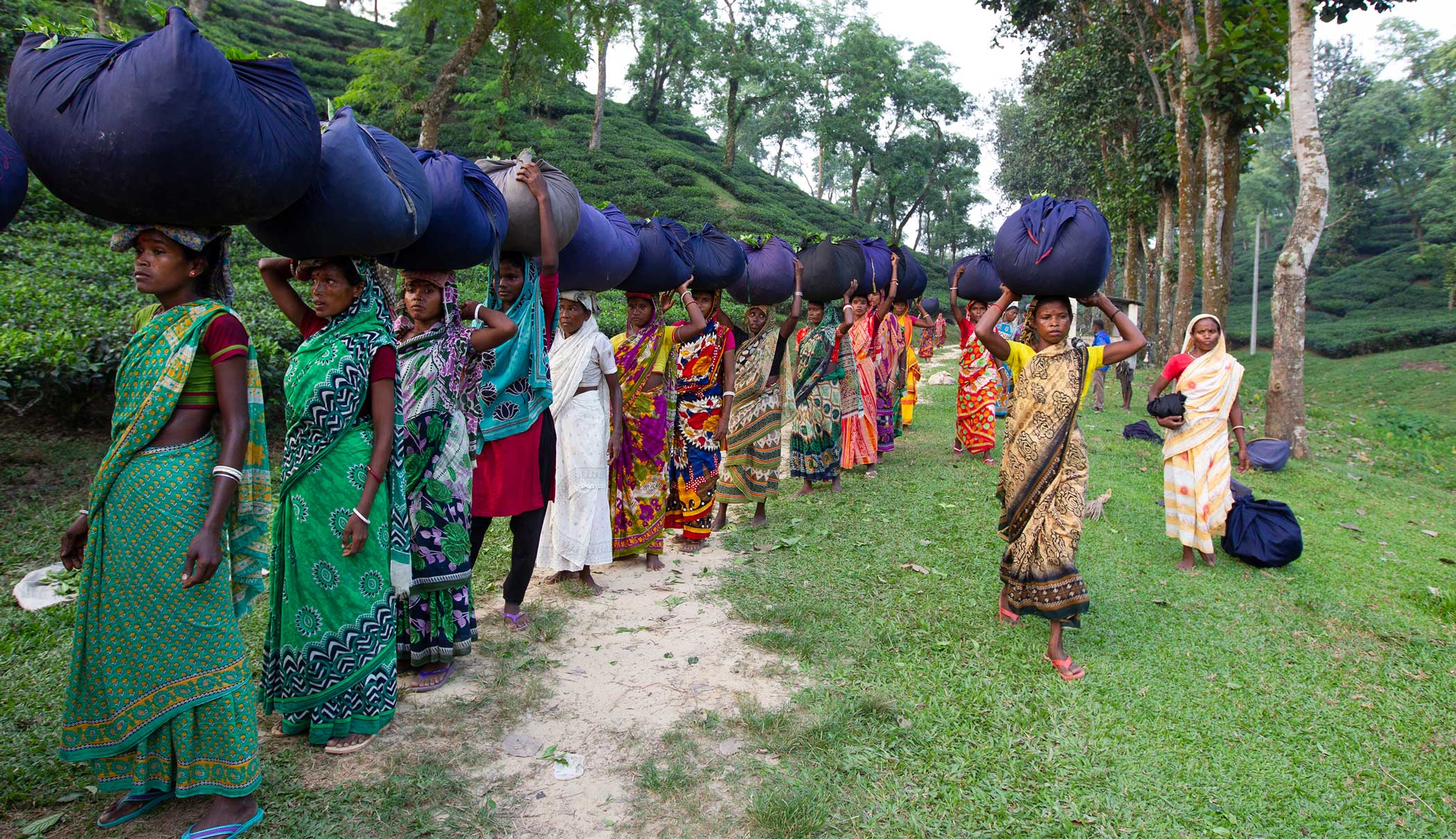Why are the tea workers on strike?

There was agitation in 158 tea gardens in Sylhet and Chattogram divisions during the tea-leaf-plucking season when the tea workers began a two-hour strike from August 9-12. On August 13, they went on a full-day strike. Bangladesh Cha Sramik Union (BCSU), the only trade union of around 100,000 tea garden workers, is organising the strike.
The key message of the tea workers and their union to the owners is that they are fed up with the owners' position regarding their wages. Currently, a tea worker gets a daily wage of Tk 120. BCSU is demanding a daily cash pay of Tk 300, which is impossible given the current trend of pay rise.
The BCSU, the combined bargaining agent (CBA) for the tea workers, and Bangladesh Tea Association (BTA), tea garden owners' representative body, sign an agreement every two years determining the wages and other benefits of the tea workers. In negotiations between these two parties, BTA is always the winner, and BCSU the loser.
An agreement between the BCSU and BTA was last signed on February 25, 2021, fixing the daily cash pay to Tk 120 for "A" class tea gardens, Tk 118 for "B" class gardens and Tk 117 for "C" class tea gardens. These wages were effective from January 1, 2019 to December 30, 2020, which means the agreement was signed post factum.
Generally, the agreements are not signed in time and the workers get their additional pay in arrears. But since the last agreement period expired in December 2020, more than 19 months have passed without an agreement and increase in wages.
In the meantime, the government had set up a Minimum Wage Board (for the third time for the tea workers) in the second half of 2019 to fix tea workers' wages. In the six-member board, Rambhajan Kairi represented the tea workers and demanded a daily cash pay of Tk 300. But to the disappointment of the workers, the wage board sent its recommendation to the labour ministry in June 2021, keeping the daily cash pay unchanged and curtailing some benefits that the tea workers had traditionally been receiving.

The labour ministry thankfully sent the recommendations back to the wage board for reconsideration. A meeting on November 17, 2021 chaired by the state minister of the labour ministry with the members of the Minimum Wage Board, BTA and BCSU was organised to find a solution to the stalemate. The labour ministry reportedly issued some guidelines to the wage board. But again, to the surprise of the tea workers, the wage board maintained its position in keeping the wages of tea workers at Tk 120 per day.
In the meantime, the chairman of the wage board has been replaced. A responsible source in the Minimum Wage Board has confirmed that in the last meeting, held on June 30, 2022, the board finalised its recommendations and sent them to the labour ministry. Rambhajan Kairi neither attended the meeting on June 30, nor did he approve the recommendations. "The recommendations were foretold," says Kairi, "And it is stuck at Tk 120, which is unacceptable to the tea workers."
Now it is to be seen when the labour ministry sends the recommendations to the law ministry, and when the wage structure of the tea workers is announced through gazette notification.
While all these have been going on, the BCSU has also been negotiating with the BTA for the last 19 months without making any headway. It is puzzling why two processes need to run at the same time. While the Minimum Wage Board fixes wages for five years, the BCSU and BTA sign an agreement every two years. The Minimum Wage Board took an unusually long time to develop its recommendations. Leaders of the BCSU allege that the BTA also did the same and pushed them to the edge. What we know from the leaders of BCSU is that the BTA proposed an increase of Tk 14 on top of Tk 120!
This is absurd for understandable reasons. Wages are not this low in the tea industry anywhere in the world. The same Minimum Wage Board has fixed the daily lowest (sixth grade) wage of Tk 620 in the wood sector in the rural areas and Tk 680 in the urban areas – one of the lowest paid sectors outside the tea garden sector fixed by the Minimum Wage Board.
The BCSU, in a letter addressed to the chairman of BTA (dated August 3, 2022), briefly narrated its grievances about their long negotiation resulting in a "shameful" proposal from the owners. According to the letter signed by the president, vice-president and acting general secretary of BCSU, the BTA representative communicated their intention to increase the wages by Tk 14 through a mobile message. Enraged, the BCSU decided to go for a strike in seven working days from August 3.
The BTA remained silent about the warning. What followed is unprecedented in the recent history of tea gardens. BCSU leaders reported that they expected the owners to respond to their demands and communicate a solution with them. But the BTA maintained its silence until August 14.
However, the Department of Labour office in Sreemangal and the director general (DG) of Department of Labour under the labour ministry have reacted. In a letter dated August 12, 2022, the DG sent a warning that "such strikes contravene the labour law."
The BCSU considers such warning from the government authorities as support for the tea garden owners that include state-owned National Tea Company and Bangladesh Tea Board under the commerce ministry that own 17 tea gardens. But this time, the BCSU is adamant not to easily back out. They went for a full-day strike on August 13, assembling at different points including in the Sreemangal town, in defiance of the law enforcement authorities.
In a meeting on August 13, the central leaders of BCSU announced its next programme. On August 14 (Sunday and weekly holiday in almost all tea gardens) and August 15 (national holiday), they would continue to assemble at different locations throughout the tea growing areas to show their disappointment with the owners. If the BCSU does not a get a response from the BTA, it is determined to continue the strike.
Tea workers are among the most marginalised, excluded and poor of Bangladesh. The biggest problem they face is wage deprivation. Needless to say, a worker's family income is far below the poverty level income, causing further deprivation for them. This time they have seen how the owners have hijacked the Minimum Wage Board and kept their future hanging in the balance. All these are happening at a time when tea production has reached its peak and there is no evidence that tea is a losing enterprise.
It is the responsibility of the government to establish rules of fair trade in the tea sector, and ensure justice and protection for tea workers, who are the most important asset for the country's tea industry.
Philip Gain is a researcher and director at the Society for Environment and Human Development (SEHD).




 For all latest news, follow The Daily Star's Google News channel.
For all latest news, follow The Daily Star's Google News channel. 
Comments